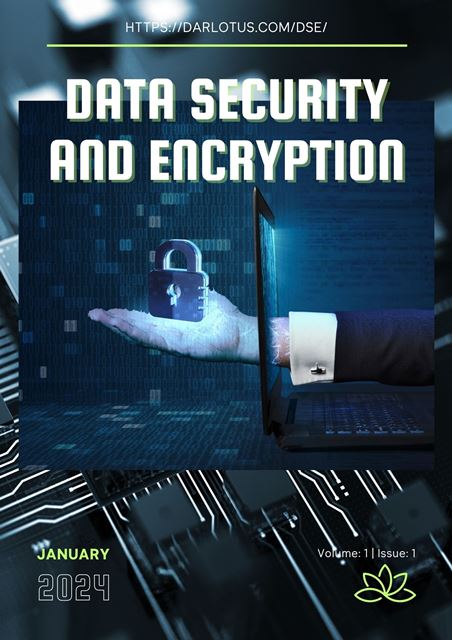Data Security and Encryption
Open Editor Positions
Are you a passionate scholar with a keen eye for excellence? Do you thrive in a dynamic environment and relish the opportunity to shape the future of your field? If so, This Journal may have the perfect opportunity for you! We are currently seeking talented and dedicated individuals to join our esteemed editorial team as “Subject Editor”.
Propose a Special Issue
Special issues offer a unique opportunity for academic journals to delve deeper into specific topics, showcase cutting-edge research, and attract a wider readership. Take the lead in showcasing a particular research topic by spearheading a Special Issue.
Propose a New Journal
Do you have a groundbreaking idea for an academic journal? Are you passionate about shaping the future of your field and fostering innovation? Darlotus is seeking innovative proposals for new journals across a wide range of disciplines.
Data Security and Encryption serves as a forum for both theoretical and applied aspects of cybersecurity, and is published in two versions: a theoretical version that includes original articles with never-before-published content, and a practical version that includes articles of high quality that are relevant for their technological content and aim for practical results. Promoting cybersecurity, digital forensics, incident response, and threat investigations is a key component of the Journal’s purpose.
We encourage contributions describing innovative work in the realm of the measures that governments or organizations should follow to protect the online information & critical infrastructure, the impacts of cyber-crime & cyber-attacks in organizations and/or individuals, malware/ransomware, analysis & reversing, hardware/software security testing, zero-day attacks & exploits, large-scale digital investigations, unconventional penetration testing tactics, techniques & tools, social engineering & human hacking, anti-forensics & anti-anti-forensics, identity theft & protection, women in cybersecurity & challenges faced by women in cyber forensics, relevant case studies in cybersecurity, digital forensics, incident response, & threat investigations, and proficient strategies for tackling the various types of cyber-attacks and cyber-crimes.
Aims and Scope
Data Security and Encryption is a peer-reviewed academic journal that publishes original research on the evolving landscape of security, privacy, and trust in the digital age. We welcome submissions that explore innovative approaches to safeguarding data, systems, and networks in a world increasingly reliant on emerging technologies.
Core Themes:
- Emerging Technologies and Security: The journal focuses on the security implications of novel technologies like Blockchain, artificial intelligence (AI), 5G/6G networks, and the Internet of Things (IoT). We are particularly interested in research that explores how these technologies can be leveraged to enhance trust and security within critical infrastructure, mobile platforms, and cloud environments.
- Advanced Security Paradigms: We encourage submissions that delve into cutting-edge security paradigms such as Software-Defined Security (SD-Sec), game theory applications in cybersecurity, and machine learning techniques for threat intelligence and anomaly detection.
- Data Privacy and Forensics: The journal welcomes research related to data leakage prevention, data protection strategies, and digital forensics investigations across virtual, cloud, and physical environments. This includes investigations of insider threats, malware analysis, and the evidentiary aspects of digital investigations.
- Cryptographic Techniques and Trust Systems: Submissions exploring novel cryptographic algorithms and protocols for securing communications and data are welcome. Additionally, research on Blockchain technology and cryptocurrency-based trust systems aligns with the journal’s focus on fostering trust in the digital realm.
- Threat Analysis and Countermeasures: The journal seeks research that analyzes existing and emerging cyber threats, including non-traditional approaches. We encourage submissions exploring reverse engineering techniques, threat hunting strategies, and the development of effective countermeasures against evolving cyberattacks.
Non-Exhaustive List of Topics:
- Security analysis of existing cryptocurrencies
- AI-driven Software-Defined Security, privacy, and trust
- Blockchain technology and Cryptocurrency based trust systems
- Big Data Analysis for Cybersecurity
- Cryptography for cybersecurity (algorithms/protocols)
- Data leakage, Data protection, and Database investigations
- Evidentiary Aspects of Digital investigations
- Executable Content and Content Filtering
- Expert Systems
- Fuzzy Systems
- Game theory in aid of cybersecurity
- Identity Theft, Management Systems, Access Management Systems
- Information Hiding, Steganography, and hidden data Analysis
- Incident Management and Analysis
- Investigations of Virtual and Cloud Environments
- Investigation of Insider Attacks
- Machine learning applications in cybersecurity and threat intelligence
- Malware investigations and Anti-Malware techniques
- Network investigations and Traffic Analysis
- New threats and Non-Traditional approaches
- Open source cybersecurity tools, solutions, and applications
- Privacy-enhancing techniques
- Reverse engineering
- Security in Mobile Platforms, Mobile Agents/Artificial Intelligence
- Security Policies/Procedures, Strategic Approaches, Requirements Engineering
- Smart security of future connective systems
- Threat Hunting and Intelligence


- Print ISSN: 2682-2199
- Online ISSN: 2682-2202
- DOI:
- APC: Currently free of charge
Editor-in-Chief:
Sheng Du, China University of Geosciences
Editorial Board:
- Haipeng Fan, China University of Geosciences
- Jie Hu, China University of Geosciences
- Zixin Huang, Wuhan Institute of Technology
- Chunli Jiang, Chongqing University of Posts and Telecommunications
- Li Jin, China University of Geosciences
- Xuyang Jing, Xidian University
- Marimuthu Karuppiah, SRM Institute of Science and Technology
- Yupeng Li, China University of Geosciences
- Song Liu, Tangshan University
- Lejun Wang, Chongqing University of Posts and Telecommunications
- Wei Wang, School of Information Engineering, Zhongnan University of Economics and Law
- Pan Yu, Beijing Institute of Technology